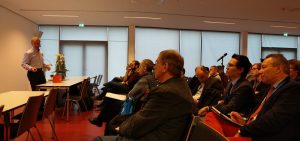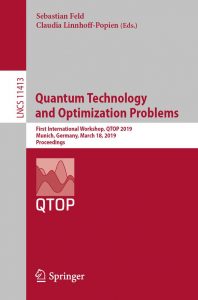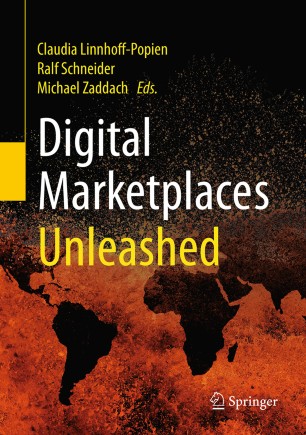
The scope of this dedicated workshop is to explore the opportunities for the application of quantum technology and optimization problems in networked systems. The workshop is part of NetSys, a biennal event originating from the key scientific conference on networked systems in German-speaking countries – KiVS (Kommunikation in Verteilten Systemen) – which was initiated 37 years ago and has international orientation since 2013. Over the last decade, a wide variety of experimental quantum computing hardware has been invented and used for fundamental demonstrations in laboratories. First results confirm feasibility of such hardware in real-world applications. Recently one can observe upcoming research in areas like traffic flow optimization, mobile sensor placement, machine learning, and many more. The development of quantum computing hardware, be it in the quantum gate model or adiabatic quantum computation (quantum annealing), made huge progress in the last years. This started to transfer knowhow from quantum technology based research to algorithms and applications. This development is offering numerous opportunities to contribute within research, theory, applied technologies and engineering. The following topics are crucial to the development of future improvements in networked systems based on quantum technology and optimization problems:
- Quantum algorithms and applications
- Experimental results and demonstrations
- Optimized algorithms and applications
- Quantum information processing and computing
- Quantum simulation and computation
- Learning with hybrid quantum-classical methods
- Optimization in Internet of Things
- Cyber-physical networked systems
- Emerging networked applications
- Further related topics
The aim of this workshop is to connect people from academia and industry to discuss about theory, technology and applications and exchange ideas to move efficiently forward in the engineering and development in the exciting area of quantum technology and optimization problems in networked systems.

Submission info for manuscripts:
Original and unpublished regular papers are solicited from the above-mentioned areas. Regular papers have a length of up to 12 pages. All manuscripts will be peer reviewed and – after presentation – be published as workshop proceedings in the series “Lecture Notes in Computer Science” (LNCS) of Springer-Verlag. Templates for the manuscripts can be downloaded from: https://www.springer.com/de/it-informatik/lncs

The formatted manuscript should be electronically submitted as pdf via EDAS: https://edas.info/N25448
Important dates:
- Paper submission due (fix!): 17th November, 2018, Anywhere on Earth (AoE)
12th November, 2018 - Notification date: 7th December, 2018
- Final manuscript due: 8th January, 2019
- Conference date: 18th-21st March, 2019
- Workshop date: 18th March, 2019
Workshop organizers:
- Sebastian Feld, LMU Munich, Germany
- Claudia Linnhoff-Popien, LMU Munich, Germany
Program Committee:
- Nick Chancellor, Durham University, UK
- Bo Ewald, D-Wave Systems, Canada
- Markus Friedrich, LMU Munich, Germany
- Thomas Gabor, LMU Munich, Germany
- Markus Hoffmann, Google, Germany
- Faisal Shah Khan, Khalifa University, Abu Dhabi
- Dieter Kranzlmueller, LRZ, Germany
- Luke Mason, Science & Technology Facilities Council, UK
- Wolfgang Mauerer, OTH Regensburg, Germany
- Catherine C. McGeoch, D-Wave Systems, Canada
- Masayuki Ohzeki, Tohoku University, Japan
- Jonathan Olson, Zapata Quantum Computing, USA
- Dan O’Malley, Los Alamos National Laboratory, USA
- Tobias Stollenwerk, DLR, Germany
Sebastian Feld (LMU Munich, Germany); Claudia Linnhoff-Popien (LMU Munich, Germany)
Robert H. (Bo) Ewald (D-Wave Systems, Canada)
Chair: Michel Barbeau, Carleton University, Canada
Embedding inequality constraints for quantum annealing optimization
Tomás Vyskocil (Los Alamos National Laboratory, USA); Scott Pakin (Los Alamos National Laboratory, USA); Hristo
N. Djidjev (Los Alamos National Laboratory, USA)
Assessing Solution Quality of 3SAT on a Quantum Annealing Platform
Thomas Gabor (LMU Munich, Germany); Sebastian Zielinski (LMU Munich, Germany); Sebastian Feld (LMU Munich,
Germany); Christoph Roch (LMU Munich, Germany); Christian Seidel (MVI Proplant, Germany); Florian Neukart
(Volkswagen Group of America, USA); Isabella Galter (Volkswagen Data:Lab, Germany); Wolfgang Mauerer (OTH
Regensburg; Siemens Corporate Research); Claudia Linnhoff-Popien (LMU Munich, Germany)
Principles and Guidelines for Quantum Performance Analysis
Catherine C McGeoch (D-Wave Systems, Canada)
Chair: Sebastian Feld, LMU Munich, Germany
Nash embedding and equilibrium in pure quantum states
Faisal Shah Khan (Khalifa University, Abu Dhabi); Travis S. Humble (Oak Ridge National Lab, USA)
A Quantum Algorithm for Minimising the Effective Graph Resistance upon Edge Addition
Finn de Ridder (Radboud University, Netherlands); Niels Neumann (TNO, Netherlands); Thijs Veugen (TNO,
Netherlands; CWI, Netherlands); Robert Kooij (Singapore University of Technology and Design, Singapore; Delft
University of Technology, Netherlands)
Variational Quantum Factoring
Eric Anschuetz (Zapata Computing, USA); Jonathan Olson (Zapata Computing, USA); Alán Aspuru-Guzik (Zapata
Computing, USA); Yudong Cao (Zapata Computing, USA)
Function Maximization with Dynamic Quantum Search
Charles Moussa (TOTAL American Services, USA; Oak Ridge National Laboratory, USA); Henri Calandra (TOTAL SA,
France); Travis Humble (Oak Ridge National Laboratory, USA)
Chair: Catherine C. McGeoch, D-Wave Systems, Canada
Flight Gate Assignment with a Quantum Annealer
Tobias Stollenwerk (DLR, Germany); Elisabeth Lobe (DLR, Germany); Martin Jung (DLR, Germany)
Solving Quantum Chemistry Problems with a D-Wave Quantum Annealer
Michael Streif (Volkswagen Group, Germany); Florian Neukart (Leiden University, Netherlands; Volkswagen Group of
America, USA); Martin Leib (Volkswagen Group, Germany)
Solving large Maximum Clique problems on a quantum annealer
Elijah Pelofske (Los Alamos National Laboratory, USA); Georg Hahn (Lancaster University, U.K.); Hristo Djidjev
(Los Alamos National Laboratory, USA)
Quantum Annealing based Optimization of Robotic Movement in Manufacturing
Arpit Mehta (BMW AG, Germany); Murad Muradi (BMW AG, Germany); Selam Woldetsadick (BMW AG, Germany)
Quantum Annealing of Vehicle Routing Problem with Time, State and Capacity
Hirotaka Irie (DENSO Corporation, Japan); Goragot Wongpaisarnsin (Toyota Tsusho Nexty Electronics, Thailand);
Masayoshi Terabe (DENSO Corporation, Japan); Akira Miki (DENSO Corporation, Japan); Shinichirou Taguchi (DENSO
Corporation, Japan)
Boosting quantum annealing performance using evolution strategies for annealing offsets
tuning
Sheir Yarkoni (D-Wave Systems, Canada; Leiden University, Netherlands); Hao Wang (Leiden University,
Netherlands); Aske Plaat (Leiden University, Netherlands); Thomas Bäck (Leiden University, Netherlands)
Chair: Wolfgang Mauerer, OTH Regensburg, Germany
Quantum Photonic TRNG with Dual Extractor
Mitchell A. Thornton (Southern Methodist University, USA); Duncan L. MacFarlane (Southern Methodist University,
USA)
Secure Quantum Data Communications Using Classical Keying Material
Michel Barbeau (Carleton University, Canada)
Continuous-variable Quantum Network Coding Against Pollution Attacks
Tao Shang (Beihang University, China); Ke Li, Ranyiliu Chen (Beihang University, China); Jianwei Liu (Beihang
University, China)
On the Influence of Initial Qubit Placement During NISQ Circuit Compilation
Alexandru Paler (Johannes Kepler University, Austria)
Towards a Pattern Language for Quantum Algorithms
Frank Leymann (University of Stuttgart, Germany)

